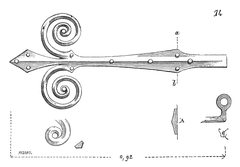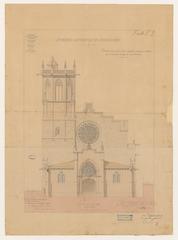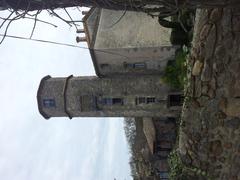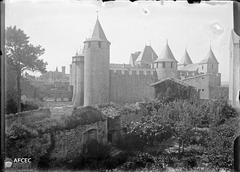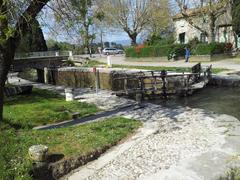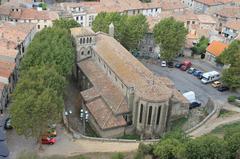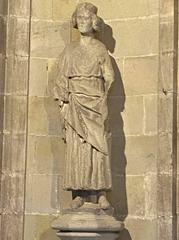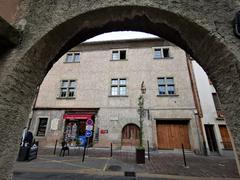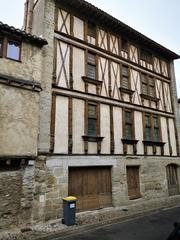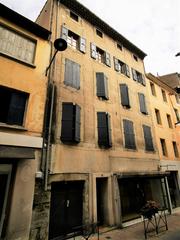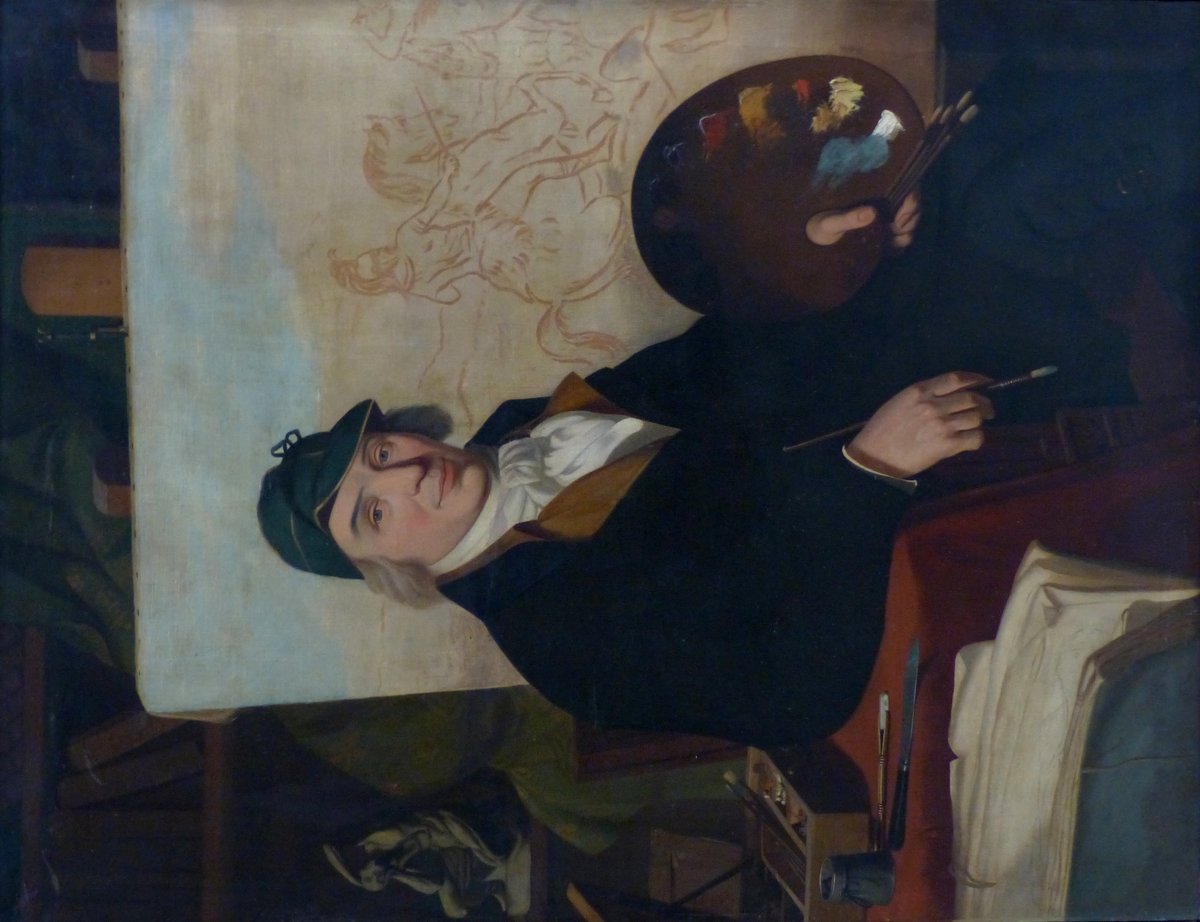
Comprehensive Guide to Visiting Cathédrale Saint-Michel, Carcassonne, France
Date: 23/07/2024
Introduction
Cathédrale Saint-Michel in Carcassonne, France, is a must-visit destination for history enthusiasts and travelers alike. Nestled in the heart of this medieval city, the cathedral is a testament to the rich cultural and architectural heritage of the region. Originally constructed in the 13th century under the orders of King Louis IX, Cathédrale Saint-Michel has witnessed numerous historical events, including the Albigensian Crusade and the French Wars of Religion (Carcassonne.org). Over the centuries, the building has evolved from a modest parish church to a grand cathedral, reflecting the shifting styles and needs of the times. Architectural enhancements, particularly during the Gothic revival in the 19th century led by Eugène Viollet-le-Duc, have cemented its status as a significant cultural landmark (Wikipedia). Today, visitors to Cathédrale Saint-Michel can marvel at its intricate Gothic details, explore its serene interior, and learn about the ongoing preservation efforts that ensure its historical integrity remains intact. This comprehensive guide aims to provide all the necessary information for an enriching visit, including the cathedral’s history, visitor tips, and nearby attractions.
Table of Contents
- Introduction
- Historical Background
- Visitor Information
- Travel Tips
- Nearby Attractions
- Special Events and Guided Tours
- Preservation Efforts
- FAQ
- Conclusion
Historical Background
Origins and Early History
Cathédrale Saint-Michel, located in Carcassonne, France, has a rich history that dates back to the 13th century. Constructed in 1247 under the orders of Saint Louis (King Louis IX), the cathedral was initially a parish church serving the growing population of Carcassonne, which was expanding beyond the confines of the medieval citadel known as La Cité.
Architectural Evolution
The original structure of Cathédrale Saint-Michel was relatively modest. Over the centuries, it underwent significant modifications and expansions, reflecting changing architectural styles and the building’s growing importance. In the 14th century, the church was fortified during the Hundred Years’ War, including the addition of a robust bell tower that also functioned as a watchtower.
Transition to Cathedral Status
In 1803, Cathédrale Saint-Michel was elevated to cathedral status, replacing the older Cathédrale Saint-Nazaire within La Cité. This elevation was part of a broader reorganization of the Catholic Church in France following the Concordat of 1801, an agreement between Napoleon Bonaparte and Pope Pius VII.
Gothic Revival and Restoration
The 19th century saw a revival of interest in Gothic architecture, leading to significant restoration efforts at Cathédrale Saint-Michel. The renowned architect Eugène Viollet-le-Duc, famous for his work on Notre-Dame de Paris and the medieval city of Carcassonne, played a crucial role in these restorations.
Impact of Wars and Natural Disasters
Cathédrale Saint-Michel has endured numerous challenges throughout its history, including wars and natural disasters. During the French Wars of Religion in the 16th century, the cathedral suffered damage from Protestant forces. The French Revolution also saw the desecration or repurposing of many religious structures. Additionally, the cathedral has faced damage from fires and earthquakes, necessitating ongoing restoration and preservation efforts.
Modern-Day Significance
Today, Cathédrale Saint-Michel stands as a testament to the rich history and architectural heritage of Carcassonne. It serves as an active place of worship and a significant cultural landmark. Its historical and architectural significance has made it a popular destination for tourists and scholars alike.
Visitor Information
Visiting Hours
Cathédrale Saint-Michel is open to the public daily, typically from 9:00 AM to 6:00 PM. However, it is advisable to check the official Cathédrale Saint-Michel website for the most up-to-date information on opening hours, as they may vary during special events or religious services.
Tickets and Entrance Fees
Admission to Cathédrale Saint-Michel is free, though donations are welcome to support ongoing preservation efforts. Guided tours are available for a small fee, providing deeper insights into the cathedral’s history and architectural features.
Accessibility
The cathedral is partially accessible to visitors with mobility impairments. There are ramps and designated areas for wheelchair users, but some parts of the cathedral may be difficult to access due to the historical nature of the building.
Travel Tips
Best Times to Visit
To avoid crowds and enjoy a more peaceful visit, consider arriving early in the morning or later in the afternoon. The cathedral is less busy during weekdays compared to weekends and holidays.
Photography Tips
Cathédrale Saint-Michel offers numerous photographic opportunities. Capture the intricate details of the stained glass windows, the grandeur of the bell tower, and the serene interior. Photography is allowed, but please be respectful of ongoing services and other visitors.
Nearby Attractions
La Cité de Carcassonne
Just a short walk from Cathédrale Saint-Michel, La Cité de Carcassonne is a UNESCO World Heritage site and one of the best-preserved medieval fortresses in Europe. Explore its impressive walls, towers, and narrow streets to get a sense of medieval life.
Basilica of Saints Nazarius and Celsus
Located within La Cité, this basilica is another architectural marvel worth visiting. It features stunning stained glass windows and a mix of Romanesque and Gothic styles.
Special Events and Guided Tours
Cathédrale Saint-Michel hosts various special events throughout the year, including religious festivals, concerts, and cultural events. Guided tours are available, offering detailed insights into the cathedral’s history and architecture. Check the official website for the schedule of events and tour availability.
Preservation Efforts
Preserving Cathédrale Saint-Michel for future generations is a priority for both local authorities and heritage organizations. Ongoing restoration projects aim to address structural issues, repair damage from natural wear and tear, and maintain the cathedral’s historical integrity. These efforts are supported by both public funding and private donations, reflecting the community’s commitment to preserving this important cultural landmark.
FAQ
What are the visiting hours for Cathédrale Saint-Michel?
Visiting hours are typically from 9:00 AM to 6:00 PM, but it’s best to check the official website for the most current information.
How much do tickets cost for Cathédrale Saint-Michel?
Admission is free, though donations are appreciated. Guided tours are available for a small fee.
Is Cathédrale Saint-Michel accessible?
The cathedral is partially accessible, with ramps and designated areas for wheelchair users, although some areas may be challenging to access.
Can I take photos inside Cathédrale Saint-Michel?
Yes, photography is allowed, but avoid using flash and tripods to preserve the delicate interior decorations and stained glass windows.
Conclusion
Cathédrale Saint-Michel is not just a place of worship but a historical monument that encapsulates the rich and varied history of Carcassonne. Its architectural evolution, resilience through wars and natural disasters, and ongoing preservation efforts make it a must-visit destination for anyone interested in history, architecture, and culture. For more detailed information, you can visit the official Cathédrale Saint-Michel website.
References
- Wikipedia. (n.d.). Cathédrale Saint-Michel de Carcassonne. Retrieved from Wikipedia
- Carcassonne.org. (n.d.). Cathédrale Saint-Michel. Retrieved from Carcassonne.org

